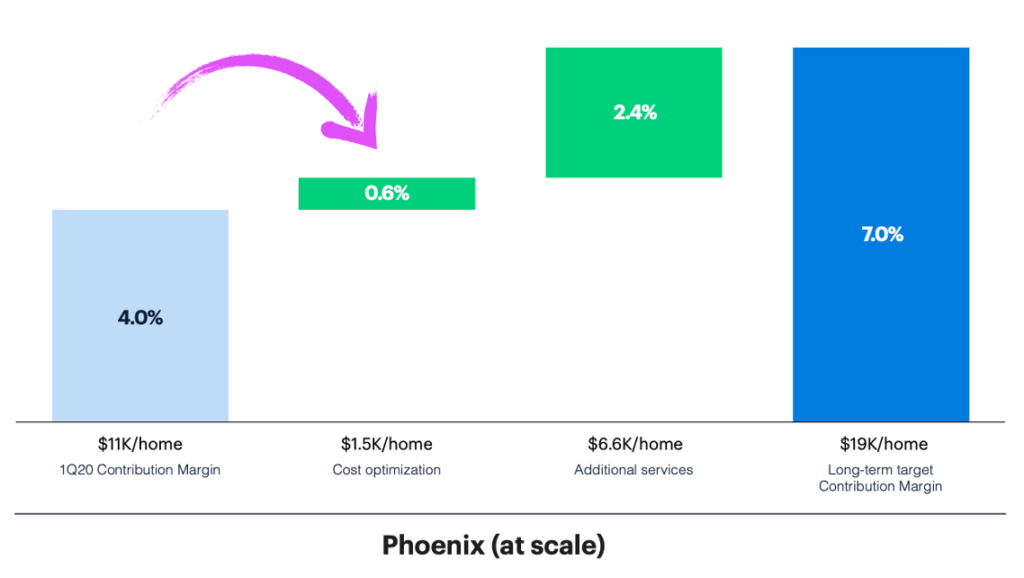This post has been republished with permission from Mike DelPrete.
For years, the traditional real estate commission structure in the U.S. has remained relatively impervious to change. Buyer agent commissions — the fee paid to a buyer’s agent when a house is sold — is the focus of multiple class-action lawsuits. But it turns out that the biggest threat to the traditional structure might be iBuyers, which have been waging a silent, systematic war on buyer’s agent commissions.
This research study looks at buyer agent commissions offered by iBuyers: 11,500 transactions over two years across four of the largest iBuyer markets: Phoenix, Atlanta, Raleigh and Dallas.
The data is sourced from the multiple listing systems in each market, which records buyer’s agent commissions offered for every home listed for sale. The data does not include transactions that occur off-market (sales to REITs) nor to buyers that approach iBuyers directly, without an agent.
A history of cost optimization
Since the beginning, an iBuyer’s biggest expense has been agent commissions — specifically the buyer’s agent fee of around 3 percent when a home is resold. This fee is highlighted as “selling costs” in Opendoor’s recent investor presentation.

Like many good businesses, Opendoor has attacked this cost with vigor (acquiring Open Listings, launching “Buy With Opendoor,” and offering 1 percent savings when buying with a partner agent). Opendoor isn’t shy about it; the same investor presentation lays out a game plan to profitability that includes a further 0.6 percent “cost optimization” on each home sold.
In other words: Opendoor’s target for selling costs is 2 percent, of which the buyer’s agent commission is the single largest component.
Systematic fee compression
Opendoor has systematically reduced buyer’s agent commissions in Phoenix, its largest market, over the past 18 months. In early 2019, it started offering 2.5 percent commissions alongside 3 percent commissions (a wonderful A/B test).
The results must have been promising because Opendoor subsequently stopped offering 3 percent commissions in favor of an even-lower 2.25 percent starting in February 2020, well below Phoenix’s average buyer agent commission of 2.8 percent.


The trend and timing is similar in Dallas — a reflection of a corporatewide initiative to reduce expenses by lowering buyer’s agent commissions. At the same time in early February, Opendoor began offering 2.5 percent commissions in place of 3 percent.

Raleigh shows an identical trend with consistent timing. The average buyer’s agent commission is 2.4 percent, but at the same time — February 2020 — Opendoor pushed down its commissions to 2.2 percent.

Atlanta is where things get interesting. Opendoor began offering 2.75 percent commissions in late 2019, before introducing even lower 2.5 percent commissions in early February 2020. However, Opendoor also began testing super-low 1.5 percent commissions in late 2019.

Opendoor appears to be testing how low buyer’s agent commissions can go before it adversely affects time on market (agents might be less likely to show homes that are offering low buyer’s agent commissions).
Zillow follows suit
Opendoor is not alone in its drive to push down buyer’s agent commissions. Zillow has the same financial incentive and has also been offering lower commissions over time in its biggest markets.
In Phoenix, Zillow matched Opendoor and began offering 2.25 percent buyer’s agent commissions in mid-2020, a significant reduction from the full 3 percent offered pre-COVID.

At the same time — July 2020 — Zillow dropped its buyer agent commission to 2.5 percent in Atlanta. The evidence suggests that, like Opendoor, this was a coordinated effort affecting multiple markets simultaneously.

In comparison to Opendoor, Zillow is both later to the party and less aggressive in its testing. Opendoor began reducing buyer’s agent commissions in April 2019, compared to Zillow waiting until July 2020. But the intent is identical to Opendoor: gradually reduce buyer’s agent commissions.
According to a Zillow spokesperson, “Agents can feel confident in a smooth, fast and easy sale when advising their client interested in a Zillow-owned home, knowing that some of the major hurdles of a traditional transaction have been taken care of prior to their clients having even toured the home.” For Zillow, the argument appears to be a lower fee for less work.
Offerpad, the third-largest iBuyer, is the outlier. It has not dropped buyer agent commissions in any of its large markets. It is “firmly committed to their agent community” and “continue to offer buyer agents 3 percent in commissions,” according to a spokesperson. The data concurs.
Good for Opendoor, or good for consumers?
Opendoor is effectively doing what consumers cannot: negotiating lower buyer’s agent commissions. The class-action lawsuits argue that buyer’s agents should “compete to be retained by offering a lower commission” — in other words, a free market should dictate buyer agent fees.
Although it’s difficult for a consumer to negotiate — and see a direct financial benefit from — a lower buyer’s agent commission, it is very easy for Opendoor and Zillow. The iBuyers have the scale, financial muscle and incentive to challenge the status quo.
Dropping buyer’s agent commissions has a direct financial benefit for iBuyers. The cost savings are not ending up in consumer’s pockets … yet. But Opendoor, in particular, appears to be indirectly passing some savings on to consumers.
In September, it dropped its average service fee to just 5 percent, and it has repeatedly stated its intent to further reduce fees.
With 2019 losses totaling over $300 million, Opendoor is highly incentivized to reduce its expenses. Systematically reducing the buyer’s agent commission is a logical move, but not everyone benefits. It appears that the success of the iBuyer model comes at the expense of the traditional real estate commission structure.
Mike DelPrete is a strategic adviser and global expert in real estate tech, including Zavvie, an iBuyer offer aggregator. Connect with him on LinkedIn.













